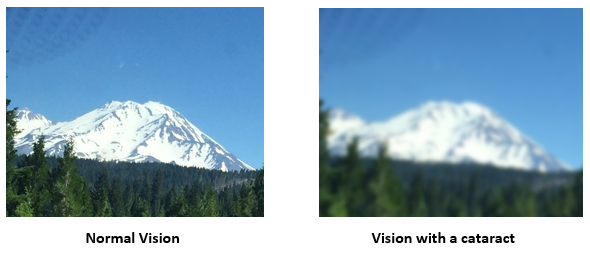By admin | Jan 19, 2018

Our eye works similar to a camera. The front of our eye, the tear film, cornea, pupil and lens help focus light. This light is then focused onto the retina which is the film of the camera. The retina takes light impulses and changes it into electrical signals which are then sent to the brain where they are developed as images.
The lens of our eye is a very metabolically active tissue. Over time, it becomes thicker and more opaque, resulting in what we commonly call a cataract. A cataract is usually a normal aging change, although sometimes it can be influenced by other factors such as inflammation or trauma. When a cataract forms, it is similar to a dirty window. It blocks the passage of light, and can also scatter light. Usually, if everything else in the visual system is functioning normally, after cataract surgery, vision is much improved.
But what happens when there is something wrong with the retina, the film of the camera?
There are many diseases that affect the retina including diabetes, macular degeneration, retinal detachments and macular hole. Proper positioning of the retina is very important for it to work properly. If the retina is permanently damaged in any way, it will not work properly. Therefore, even if you remove the cataract and replace it with a clear artificial lens, images will be sharply focused on the retina but will not be clear because the film of the camera is damaged. Therefore, when the light signals are converted to electrical signals, there will still be defects, and this will affect your best corrected vison.
More importantly, the presence of certain retinal diseases such as diabetes and wet macular degeneration, are very important when discussing having cataract surgery. These diseases need to be under proper control in the eye, and sometimes, your doctor will recommend injection of medication prior to cataract surgery to help maintain this stability postoperatively. This is because any surgery is associated with some level of inflammation. Sometimes, inflammation will cause changes in the underlying retinal diseases. If not properly managed, this can cause permanent damage to the retina, thereby limiting how well you will eventually be able to see.
Addressing and managing retinal diseases is very important when either discussing cataract surgery or planning to have surgery. You retinal specialist will have detailed discussions with you regarding what you can expect. It is important to work closely with the cataract surgeon to ensure expectations are appropriate, and that you will be getting the most optimal outcome. Here at Retina Consultants of Boston, we believe in optimizing treatment of any underlying retinal diseases before undergoing cataract surgery. Our team is dedicated to ensuring the best possible surgery outcome for our patient by clear communication with patients and working closely with your cataract surgeon. We are currently accepting new patients, please call and make an appointment today!
In the interest of maintaining further transparency and providing a wide breadth of information to our patients and providers, this blog will serve as an educational and informative resource on interesting happenings within Retina Consultants of Boston and in the greater field of Ophthalmology.
Here at Retina Consultants of Boston, Dr. John J. Weiter and Dr. Namrata Nandakumar are on the forefront of diagnostic techniques, treatment and micro-surgical techniques for macular degeneration, diabetic retinopathy, retinal detachments, macular holes, and a number of other issues affecting the vitreous and retina. Check back here frequently for news and updates on our practice and all things retina!